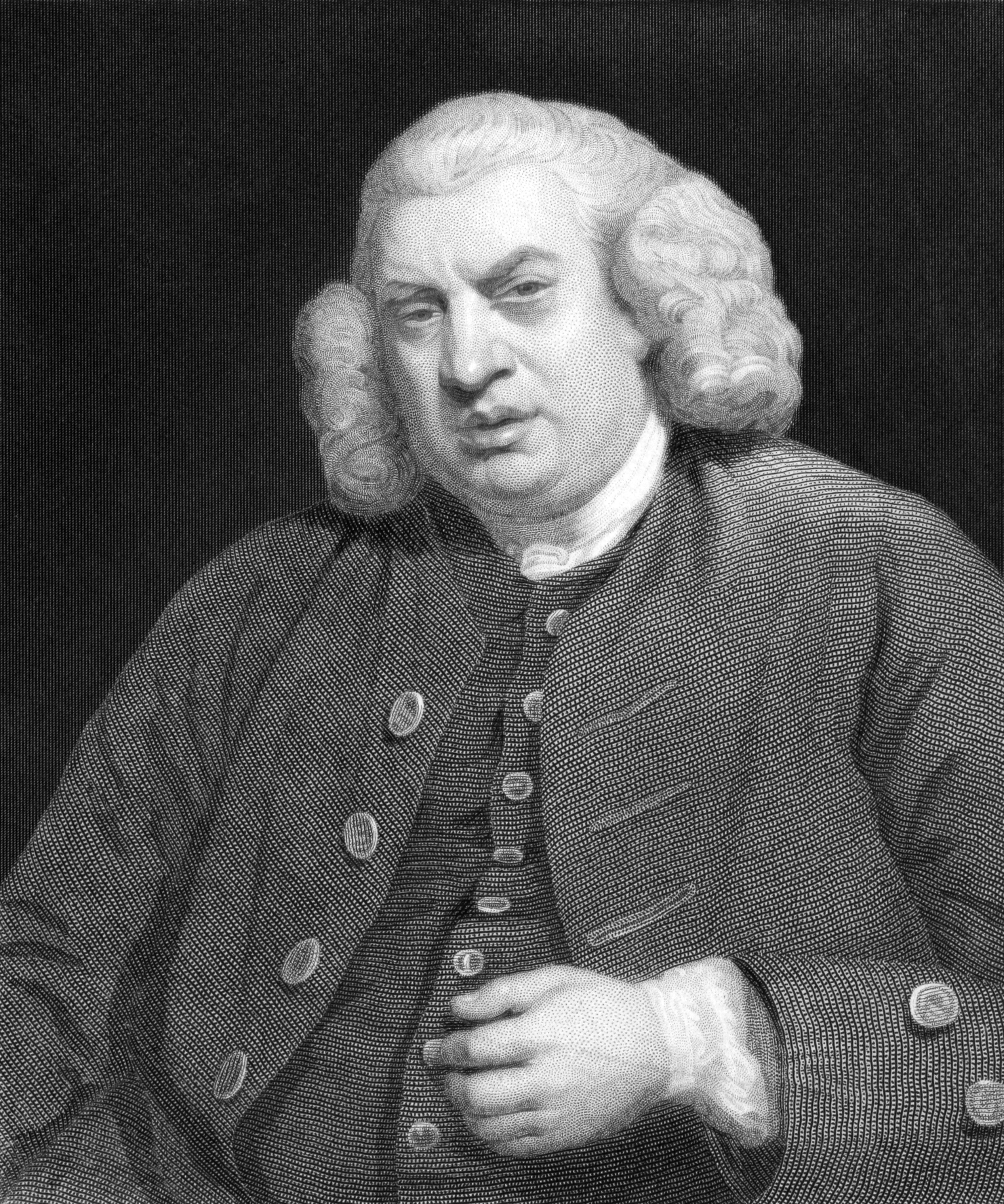Samuel Johnson frasi celebri
“Richardson aveva colto il nocciolo della vita… mentre Fielding si era accontentato del guscio.”
da Thraliana , a cura di Balderston, I, p. 555
riferendosi ai critici; citato in James Boswell, Vita di Samuel Johnson, 1754
citato in James Boswell, Vita di Samuel Johnson, 14 luglio 1763
“Ciò che è scritto senza sforzo è generalmente letto senza piacere.”
da Miscellanies
Johnson Miscellanies
Samuel Johnson Frasi e Citazioni
“Fielding è capace di descrivere un cavallo o un asino ma non ci è mai riuscito con un mulo.”
da Johnson Miscellanies, a cura di George Birkbeck Norman Hill, I, pp. 273-4
Origine: Citato in Ian Watt, Le origini del romanzo borghese (The Rise Of The Novel), traduzione di Luigi Del Grosso Destrieri, Bompiani, Milano, 1985.
“Le cifre tonde sono sempre false.”
citato in Apophthegms, Sentiments, Opinions and Occasional Reflections di Sir John Hawkins, in Johnsonian Miscellanies (1897), vol. II, pag. 2, edito da George Birkbeck Hill
Johnson Miscellanies
citato in James Boswell, Vita di Samuel Johnson, 30 aprile 1773
Origine: Citato in John Lukacs, Democrazia e populismo, traduzione di Giovanni Ferrara degli Uberti, Longanesi, 2006, p. 152.
citato in James Boswell, Vita di Samuel Johnson
Your manuscript is both good and original, but the part that is good is not original and the part that is original is not good.
[Citazione errata] Questa citazione viene spesso attribuita a Johnson ma non trova alcun riscontro nelle opere o nelle lettere dello scrittore, né tanto meno nelle biografie di Johnson scritte dai suoi contemporanei.
Attribuite
Origine: Samuel Johnson did not say: "Your manuscript is both good and original. But the part that is good is not original, and the part that is original is not good." http://www.samueljohnson.com/goodorig.html, Samuel Johnson.com.
“In quante poche case degli amici sceglierebbe di stare un uomo quando è ammalato!”
Origine: Citato in Boswell, Life of Johnson, IV.
Origine: Citato in Dizionario delle citazioni, a cura di Italo Sordi, BUR, 1992. ISBN 14603-X
“La natura ha dato alla donna un tale potere che la legge ha giustamente deciso di dargliene poco.”
Origine: Da Letters, I.
Origine: Citato in Dizionario delle citazioni, a cura di Italo Sordi, BUR, 1992. ISBN 14603-X
Samuel Johnson: Frasi in inglese
April 17, 1778, p. 396
Life of Samuel Johnson (1791), Vol III
“The endearing elegance of female friendship.”
Origine: The History of Rasselas, Prince of Abissinia (1759), Chapter 46
Reported in Josiah Hotchkiss Gilbert, Dictionary of Burning Words of Brilliant Writers (1895), p. 613
Actually said by Charles de Gaulle, on leaving his presidency, as quoted inLife' (9 May 1969)
Misattributed
“Human life is everywhere a state in which much is to be endured and little to be enjoyed.”
Origine: The History of Rasselas, Prince of Abissinia (1759), Chapter 11
March 28, 1776, p. 296
Life of Samuel Johnson (1791), Vol III
“Must helpless man, in ignorance sedate,
Roll darkling down the torrent of his fate?”
Origine: Vanity of Human Wishes (1749), Line 345
1763
Bartlett's Familiar Quotations, 10th ed. (1919), Life of Johnson (Boswell)
August 31 and September 23, 1773
Also quoted in Boswell's Life of Johnson
The Journal of a Tour to the Hebrides (1785)
“Wickedness is always easier than virtue; for it takes the short cut to everything.”
September 17, 1773
The Journal of a Tour to the Hebrides (1785)
A Dictionary of the English Language (1755)
“Sir, you have but two topicks, yourself and me. I am sick of both.”
May 1776 http://books.google.com/books?id=8DcUAAAAYAAJ&q=%22Sir+you+have+but+two+topicks+yourself+and+me+I+am+sick+of+both%22&pg=PA53#v=onepage, p. 313
Life of Samuel Johnson (1791), Vol III
“I am a great friend to public amusements; for they keep people from vice.”
1772
Bartlett's Familiar Quotations, 10th ed. (1919), Life of Johnson (Boswell)
The Patriot (1774)
“Sir, there is no settling the point of precedency between a louse and a flea.”
When asked by Maurice Morgann whom he considered to be the better poet — Smart or Derrick, 1783, p. 504
Life of Samuel Johnson (1791), Vol IV
“A man will turn over half a library to make one book.”
April 6, 1775
Life of Samuel Johnson (1791), Vol II
“The true, strong, and sound mind is the mind that can embrace equally great things and small.”
1778
Bartlett's Familiar Quotations, 10th ed. (1919), Life of Johnson (Boswell)
Origine: Anecdotes of Samuel Johnson (1786), p. 206
“English superiority and American obedience.”
As quoted in The Life of Samuel Johnson https://en.wikipedia.org/wiki/Special:BookSources/1-55786-664-3 (1994), by Robert DeMaria, Jr., Oxford: Blackwell, pp. 252–256.
“Gratitude is a fruit of great cultivation; you do not find it among gross people.”
September 20, 1773
The Journal of a Tour to the Hebrides (1785)
“Let observation with extensive view
Survey mankind, from China to Peru.”
Origine: Vanity of Human Wishes (1749), Line 1; comparable to: "All human race, from China to Peru, Pleasure, howe’er disguis’d by art, pursue", Thomas Warton, Universal Love of Pleasure
“The limbs will quiver and move after the soul is gone.”
Northcote, 487
Bartlett's Familiar Quotations, 10th ed. (1919), Johnsoniana
Winter, An Ode. The works of Samuel Johnson, LL.D. (1787), p. 355
“To a poet nothing can be useless.”
Origine: The History of Rasselas, Prince of Abissinia (1759), Chapter 10
Origine: Anecdotes of Samuel Johnson (1786), p. 111
“The trappings of a monarchy would set up an ordinary commonwealth.”
Life of Milton
Bartlett's Familiar Quotations, 10th ed. (1919)
“There are, in every age, new errors to be rectified, and new prejudices to be opposed.”
No. 86 (12 January 1751)
The Rambler (1750–1752)
